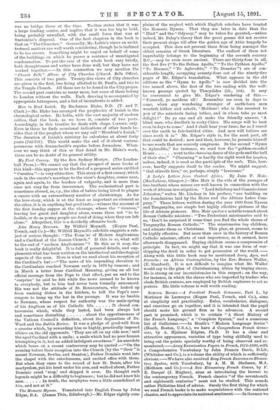The Homeric Hymns. Translated into English Prose by John Edgar,
B.A. (James Thin, Edinburgh.)—Mr. Edgar rightly com-
plains of the neglect with which English scholars have treated the Homeric Hymns. That they are later in date than the " Iliad" and the "Odyssey," may be taken for granted,—unless indeed, Mr. Paley's theory that the great poems did not receive their present shape till after the golden age of Attic tragedy be accepted. This does not prevent them from being amongst the oldest remains of Greek literature. The earliest of them not improbably belongs to the beginning of the seventh cent-ivy B.C.,—may be even more ancient. There are thirty-four in all, the first five (" To the Delian Apollo," "To the Pythia,n Apollo," "To Hermes," "To Aphrodite," "To Demeter") are of con- siderable length, occupying seventy-four out of the ninety-five pages of Mr. Edgar's translatfon. What appears in the old. editions as the "Hymn to Apollo" is now divided into the two named above, the first of the two ending with the well-
known passage quoted by Thucydides 104). It may be convenient to give Mr. Edgar's rendering of this :— "Farewell, ye maidens all ! Remember me even in days to come, when any wandering stranger of earth-born men wendeth hither and asketh, Maidens ! who is the sweetest to you of the minstrels faring hither, and in whom take ye most delight ? ' Do ye one and all make the friendly answer, A blind man, who dwelleth in rocky Chios. His songs will be best even in days to come.' And I shall hear your fame, far as I travel over the earth to fair-builded cities. And men will believe me since sooth it is." Mr. Edgar's style is, for the most part, all that could be desired ; now and then, however, he permits himself to use words that are scarcely congruous. In the second "Hymn to Aphrodite," for instance, we read how the " golden-snooded
Hours went to the charming dance of the gods and the hall of their sire." " Charming " is hardly the right word for 4tepoSets, unless, indeed, it is used as the participle of the verb. This, how- ever, hardly suggests itself to the reader. We might suggest, "that stirreth love," or, perhaps, simply "lovesome."


































 Previous page
Previous page